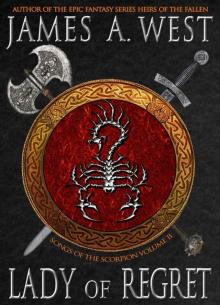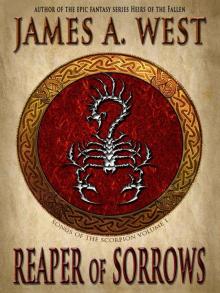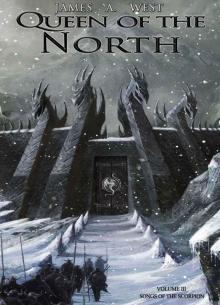- Home
- James A. West
The God King hotf-1 Page 2
The God King hotf-1 Read online
Page 2
As he tucked the weapon back into its sheath, Azuri said to Kian, “Rest assured that yours was a marvelous throw. As for this unruly cur, he is more likely to make a eunuch of himself than toss a dagger in the right direction. Better to place a cudgel in his hand, and hope he does not batter in his own head with it.”
A wide grin split the unruly plaits of Hazad’s beard. Without a word, he hawked and spat. Azuri squawked in outrage and leapt backward, nearly losing his footing in the swamp’s pervasive mud and moldering leaves. “You son of a poxy whore!”
Hazad retorted with a mocking grin. He was the only man Kian had ever seen who could put Azuri out of countenance-and the only man who had no fear of doing so.
Kian could not suppress a smile. As often as the two squabbled, and as different as they looked from one another, they were, with himself included, as close as brothers. The two had stood fast beside Kian since they were but starving urchins trying to survive in an enemy’s city. Izutarians all three, they had suffered the same plight as many children during the aftermath of the war between Izutar and Falseth. The conflict went badly for Izutar, a disorderly nation made up of dozens of rival kings with no loyalties to one another. That disharmony led to the enslavement of many thousands of his people. Izutarian parents with honor, believing that starving free was better than dying in chains, sent their children away to fend for themselves. And so, lost half a thousand leagues from the icy steppes and forested mountains of Izutar Kian, Hazad, and Azuri had found each other in the wild streets of the Falsethian coastal city of Marso. Back then, stealing food and keeping clear of slavers had been their greatest concerns. Their fortunes, guided from the beginning by Kian, had eventually changed.
Now Kian’s companions offered strong and deadly arms in keeping wealthy charges safe. Commanding a mercenary company was not an endeavor that garnered fame and glory, but it served Kian and his men well enough. These days, more than ever.
As dark times had come to Izutar, now suffered Aradan, the greatest kingdom since the fall of the Suanahad Empire. As Izutar had been, Aradan was torn as much from within as from without. With new rebellions rising almost daily, and powerful nobles often standing against the Ivory Throne itself, as well as the danger of the nomadic Bashye clans, and Tureecian raiders from the south, there was more than enough trouble to keep all three men awash in gold.
While Hazad and Azuri settled into a deeper argument, Kian retrieved his dagger. After wiping off the sap, he armed sweat from his brow. The sun had been up a mere two hours, and already the day was sweltering. But then, nights in the swamp were hardly cool in comparison. Insects of all shapes and sizes droned in the marsh’s green shadows, lighting upon exposed skin to feast on sweat or blood. Just the sound of them was enough to make his flesh itch and crawl. With equal abandon, snakes and lizards slithered or scurried through high boughs and underfoot. Unnamed beasts screamed and howled in the steamy, verdant reaches. All around, birds called and flitted in colorful flashes, but of the sixty-man company of saffron-robed Asra a’Shah mercenaries Kian had hired for this mission, he saw not one. Like the dark-skinned folk of Aradan, the lethal men of Geldain were more accustomed to sand and stone and sun than dripping marshes. Despite this, they blended effortlessly into the foreign landscape.
Kian forced himself to wait for the prince to find whatever he was looking for, all the while thinking about escaping back to the arid wastes of the Kaliayth Desert-a harsh wasteland in its own right, but far better than the swamp.
Swatting a host of midges away from his face, Kian turned to study the stone temple, a domed building of unusual, even remarkable design. It might have been beautiful at one time, but now its pitted surface was covered in vines, creepers, and witchmoss. Dampness and invading roots had crumbled its stones, giving it the look of an ancient, slumbering beast stricken with leprosy. Towering trees obscured most of the sunlight, but a few rays filtered down, and the temple’s grim surface seemed to writhe with green and gold shadows.
Kian upended his waterskin, took a long swallow, then let the lukewarm stream dribble over his sun-darkened brow and cheeks to his broad chest. Next he wetted his long, dark hair. While not wholly refreshing, the water did cool him, a little. He and his companions had never returned to their icy homelands after escaping Marso, but at the moment he wished he were there, hunting frosted evergreen forests. Maybe after Varis was safely back in Ammathor they could ride that way, see about making new lives for themselves. By day they would hunt, and by night they would gather friends and family around the hearth fire, recounting their exploits. Yes, that sounded like a fine plan.
With a resigned sigh, Kian abandoned daydreams of the future, and called Hazad and Azuri to his side.
“Tell me what you saw in the temple,” Kian said to Hazad.
The man shrugged. “Same as you. Crumbled stone, moss, rats.” Sensing the deeper question, he added, “As to anything temple-ish, there was nothing, save maybe that crusty bathtub Varis was so interested in. Far as I’m concerned, that useless vessel would barely serve as a privy pot.”
Kian looked the question at Azuri, who repeated the assessment, though it seemed to pain him to agree with Hazad.
Kian glanced anew at the temple. “If none of us saw anything of worth or interest, what is keeping Varis so long? He has been inside at least an hour, perhaps longer.”
“I cannot speak to what he has found that is so appealing,” Hazad said. “But the boy is a strange one, even among Aradaner highborn. All he seems to speak of-when he talks at all-are the lost glories of Aradan, and what could have been had the right men sat the Ivory Throne. I suppose that old book he is always reading from has filled his head full of nonsense. More a scholar than a prince, I say. Worse than a Master of Wisdom of the Magi Order, or a Sister of Najihar. No one should read so much. Bad for the eyes.”
Azuri shook his head. “Pa’amadin grant that your willful ignorance remains your curse alone.” Before Hazad could respond, Azuri said, “Yet about Prince Varis, you have a valid point. The youth seems to have more interest in the forgotten kings, than becoming a king himself.”
“The princeling is far down the line of succession,” Hazad countered. “King Simiis may not be long for the world, old as he is, but Varis’s father, Prince Sharaal, is hale, as are Varis’s brothers. There is no reason the boy should worry overmuch about sitting the Ivory Throne for a good while, if ever. For that matter, I’d say no one is worried about him sitting the throne, given that he was so easily able to take his leave from the king’s city.”
“It is never foolish to prepare for the throne when you are of royal blood,” Azuri said ominously, using his dagger to clean his already immaculate fingernails. “The days are dark in Aradan, and growing darker. Who can say who will stand and who will fall, lowborn or high?”
Kian ran a hand over his still dripping hair. “We need not worry over the dealings of kings and princes of Aradan. Our only task is to see the princeling safe back to Ammathor, and there collect our due.”
Hazad nodded in agreement, but Azuri pressed on. “We tasted war with our mothers’ milk, and as boys supped on the meat of suffering and want. As I recall, neither flavor was sweet. Aradaners, to the last, can rot in the Thousand Hells for all I care, but I will keep a wary eye, and guard against the chance of getting caught up in their rivalries. If that means worrying over the dealings of highborn, in order to know when best to leave this realm, so be it.”
Kian silently vowed that he would not get dragged too deeply into Aradan’s strife. To his mind, he and his friends had earned the right to avoid this kingdom’s brewing troubles, even if they had collected the spoils of those troubles for many years.
“If the prince wants to stay here for a time, very well,” Kian said, “but we need to make sure he has not broken his fool neck, or been bitten by a viper-I daresay a dead prince is an unpaying prince.”
With Hazad and Azuri striding along at his flanks, Kian moved toward the temple. They were
a score of paces away from the entrance when the earth shuddered with a low, almost inaudible groan. The trio halted, legs spread for balance. All around, hidden Asra a’Shah called out in alarm. From shaking trees, birds took to the sky in a discordant thunder of beating wings. When a stronger tremor hit, the shaking rumble of grinding stone filled the dank forest and threw the men to their bellies. Through a shifting screen of falling leaves, Kian saw a gaping crack spreading across the closest temple wall, and the domed roof was sagging inward, ready to collapse.
“To the prince!” Kian bellowed.
Before anyone could react, Kian was up and running, each stride precarious on ground that was no longer firm. He had not taken three steps when a blast of azure fire burst through the top of the dome and roared skyward. Those flames melded into a solid column, searing away hanging boughs. A heartbeat later a nearly invisible wall of something like air burst from the temple and sent Kian soaring. A single strand of blue fire, no thicker than his little finger, flicked out of the temple and crawled over him. At its touch a searing cold heat cut through the very fiber of his being, sank deep into his bones. All thought and awareness was blasted away, leaving only agony. Kian began screaming.
Chapter 3
Each of the four sides of Fortress Krevar’s outer wall measured a full mile in length, were a hundred paces thick at the base and tapered to twenty paces wide at the top, and stood over a hundred feet above the dusty floor of the Kaliayth Desert. At one time those walls had been a symbol of the distant Ivory Throne’s power and wealth. Now, with the extended absence of gold from Ammathor’s coffers, those walls were showing the signs of neglect, becoming an omen of Aradan’s looming demise.
Atop the Sister’s Tower, rising another hundred feet above the wallwalks, Sister Ellonlef Khala sat in a simple wicker chair enjoying the last of the cool breeze left over from the night before. For years, she had climbed the spiraling stairs before each dawn to collect her thoughts and prepare for the coming day. Over those years, she had come to understand that Aradan was suffering a slow death brought on by the internal squabbling of the king and his lords. Krevar, and all the other border fortresses, had once been well-supplied, but now the stronghold lay all but forgotten at the edge of the desert, and mostly left to fend for itself. Such freedom and anonymity might have been welcome in places that could sustain life, but built on the verge of the Kaliayth and the Qaharadin, day-to-day survival in Krevar was a brutal taskmaster that uncaringly molded and shaped its inhabitants into a hard and quietly bitter folk.
Dawn had come and gone two hours past, and now sunlight streamed through the four open arched windows ringing the tower’s square crown. As was her habit, Ellonlef sat writing in her journal. Instead of chronicling the goings on of Krevar as usual, this day she wrote that the three moons, the faces of the Three, were in near perfect alignment. At that, she gazed up at the unnerving sign. The moons had merged into what looked like a monstrous eye. The greatest of the Three, the face of the goddess Hiphkos, shone pale blue. Before her hung the middling moon, Memokk, which blazed with an amber light. Least among the Three, Attandaeus, burned a bright crimson that formed the pupil. That eye stared down on the world with undeniable malevolence. Before sunrise it had cast a greenish-red glow of putrefaction over the land. Now, with the sunlight gradually reaching the day’s full strength, the evil glare had waned.
Discomfited, she looked back at the journal. Soon she would deliver the leather-bound volume to King Simiis of Aradan, and another copy she would give to the Mother of the Najihar Order on the tiny island-city of Rida, which lay twelve leagues off Aradan’s eastern coast. From her current perch, home was nearly two hundred leagues distant. It might as well been a thousand, or ten thousand. A year left, Ellonlef thought wistfully, and her term of service and study would conclude.
She set the ink-stained scribing reed aside, sprinkled a pinch of blotting powder across the fresh words sinking into the velum page, then took a sip of tea. After a moment, she blew the chalky powder away. In the desert, ink dried as fast as everything else.
Taking another sip of tea, she supposed that Lord Marshal Otaker would be looking for her by now, no matter that she was guaranteed her quiet time. It was a rule based more on mutual respect than any authority on her part. Other lords of Aradan would not have been so lenient.
For near on a thousand years, since the fall of the Suanahad Empire, the Sisters of Najihar had exclusively served Aradan by secretly gathering knowledge from the other kingdoms of the world, as well as from within the borders of Aradan. Before that, the Sisters of Najihar, a sect solely made up of female scholars, had collected knowledge for knowledge’s sake. During the reign of Emperor u’Hadn of the shattered Suanahad Empire, all that had changed.
Emperor u’Hadn had been a man who greatly mistrusted his subordinates, and so ruled his empire with an iron fist. Of the Sisters of Najihar, u’Hadn had hated and feared them the most, though he had no reason to do so. To him, the merest potential that they could serve as the spies of his enemies meant that they should be eradicated.
Prince Edaer Kilvar, before he became the First King of Aradan, had also had his troubles with Emperor u’Hadn, his uncle. Like u’Hadn, he saw the potential in the Sisters of Najihar’s collected wisdom, but they refused to aid him in his struggle to break free of the bonds of the empire … at least until Emperor u’Hadn began a campaign of annihilation against the near defenseless Isle of Rida, to which the sisters had fled soon after u’Hadn had grasped the reins of power in Geldain.
As the prospects for the survival of Rida and the Sisters of Najihar grew dimmer, Edaer’s offer became more palatable, and the sisters finally agreed to trade their abilities of gathering information for Edaer’s protection. As it happened, he had not needed their counsel then. But in the years after his rebellion caused the Suanahad Empire to fracture into scores of rival kingdoms, he wisely used their insights to build Aradan into a great and rich kingdom, so much so that it eventually rivaled the past glories of the fallen empire that had given it birth. Edaer ultimately convinced the Sisters of Najihar to secretly produce a number of spies from among their order, which he directed against his enemies. And so it had been for near on a thousand years between the Ivory Throne and the Sisters of Najihar.
Though she had been trained in all ways of her order, Ellonlef served the Ivory Throne strictly in the capacity of an advisor to Lord Marshal Otaker, having spent nine of an allotted ten year term. Nine years. Such a long time it seemed since she had gained the white robes commonly worn by her order. While she had learned much about Aradan in general, and the desolate border fortress and the man who commanded it in particular, she desperately longed to return to the rocky shores of home, to hear the cries of gulls gliding over the fish markets, to stride the twisting alleys and streets between the white-walled buildings and colorfully tiled roofs of Rida. But home had to wait a little while yet, as did the future husband that Mother Eulari had picked out for her.
Sadrin Corron was the man’s name and, not surprisingly on the Isle of Rida, he was a fisherman. Mother Eulari claimed the young man was kind, wise, and astonishingly fair to look upon. Ellonlef had no reason to doubt her mistress, nor did she fear the woman’s choice. Mother Eulari, among other talents, had a gift for choosing satisfying mates for her daughters. Among the Mothers of the Sisters of Najihar, that was a rare blessing indeed.
Another year at Krevar would feel like an eternity, but Ellonlef would be sad to go. After a fashion, she had made Krevar her home. When she came to the fortress, she had been excited by the prospect of all the new things she would learn; it had been a generation since one of her sisters had served here. Upon reflection, she understood why the writings of Sister Fira, the last woman to have resided at Krevar, had been so impossibly dry. The very aridness of the landscape seemed to desiccate all life and emotion and desire from the folk who populated the massive fortress and the surrounding wastelands. Even the constant Tureecian and Bashye threat, and the
kingdom’s internal machinations, held little interest for the folk hereabout. To them, Ellonlef had deduced with a deep measure of sympathy, life was naught but sand and dust, followed by death. If the latter came sooner, so much the better.
The people of Krevar are as hard and uncaring as the scorched red stones that pave the desert floor, had been the first words she had written in her journal. She stood by those words, save that she now understood that, in their own way, the people cared deeply for each other, if for few others. All she would add to the original assessment was that there was also a deep, underlying anger in these people, and that discontent was rising. They felt abandoned by the Ivory Throne, and she could not disagree with that carefully buried sentiment.
Ellonlef stood, stretched up on her toes, then walked to the window overlooking the verge of land that separated the desert from the dull greenish line marking the edge of the Qaharadin Marshes. That narrow slip of terrain was a dreadful place of reeking bogs and quicksand, scrubby brush with long thorns, stinging insects beyond count, and all manner of creeping death. It was much worse within the marshes.
More than once she had accompanied Lord Marshal Otaker along Aradan’s western border from Krevar to Yuzikka to El’hadar and back, but never had she journeyed into the Qaharadin. One day she would, and in so doing would have the claim of being the first of her order to do so. That particular trek would come just before she returned home, likely in late winter, when it was not so blindingly hot. Though common folk believed Sisters of Najihar were trained mainly to study, give counsel, and serve as healers, the truth was that they were adept in everything from history to warfare to personal combat. A Sister of Najihar could take care of herself in nearly all situations, and the order rarely produced fools. Ellonlef did not count herself a fool, and surely not enough of one to leap at the chance of going blindly into the Qaharadin.

 The God King hotf-1
The God King hotf-1 Lady Of Regret (Book 2)
Lady Of Regret (Book 2) Reaper Of Sorrows (Book 1)
Reaper Of Sorrows (Book 1) The God King (Book 1) (Heirs of the Fallen)
The God King (Book 1) (Heirs of the Fallen) Heirs of the Fallen: Book 02 - Crown of the Setting Sun
Heirs of the Fallen: Book 02 - Crown of the Setting Sun Heirs of the Fallen: Book 03 - Shadow and Steel
Heirs of the Fallen: Book 03 - Shadow and Steel Heirs of the Fallen: Book 04 - Wrath of the Fallen
Heirs of the Fallen: Book 04 - Wrath of the Fallen Queen of the North (Book 3) (Songs of the Scorpion)
Queen of the North (Book 3) (Songs of the Scorpion)